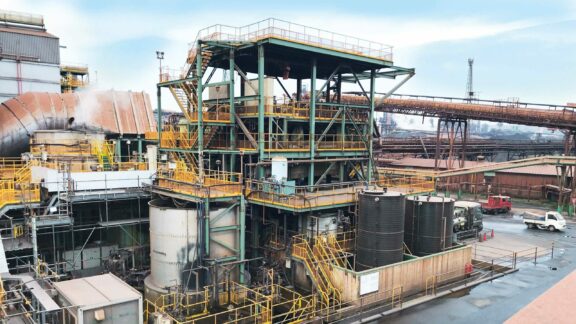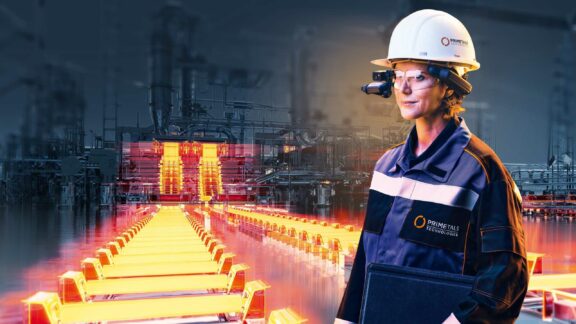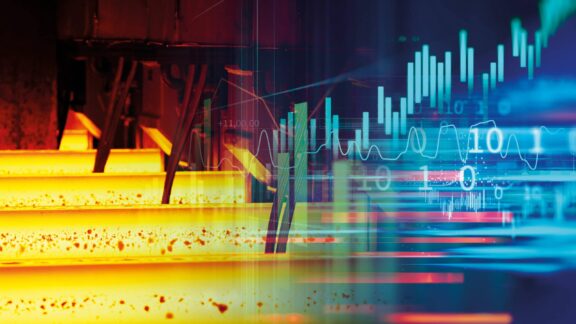Interview with Dr. Alessandro Labile, Head of environment, health, and safety at Acciaierie d’Italia
What is the significance of Acciaierie d’Italia for the economy of Taranto and the region of Puglia?
Dr. Alessandro Labile: There is an important link between our company and this region. Many of our 8,000 employees in Taranto are second-generation. The local economy strongly depends on companies like Acciaierie d’Italia. Our Taranto site connects Italy’s south with the north of the country, where we have further plants in Genoa and Novi Ligure. This setup enables us to produce high-end steels at the top of the value chain.
What are the main products of Acciaierie d’Italia?
Labile: We mainly produce plate tubes, pipes, and coiled strip for advanced applications such as automotive exposed.
You have just completed the implementation of two MEROS systems at one of your sinter plants in Taranto. Are you happy with their performance?
Labile: These two are the first of seven MEROS plants we will be installing in total. They were required to lower our emissions—especially in terms of dust, dioxins, and sulfur oxides. Governmental regulations require us to limit dust emissions to 10 milligrams per cubic meter—we have now reached a level of less than 3 milligrams. As far as dioxins go, the legal limit is set at 0.15 nanograms, and we are below 0.01. So yes, I am really happy with the performance. We will be installing two further MEROS plants at our sinter plants and three more units at power plant No. 2, where we will also add special DeNOx technology in collaboration with Primetals Technologies and Yara.
Aside from performance, were there other factors that influenced your decision to choose MEROS?
Labile: We wanted a design that would prohibit any sinter plant operation without the off-gas cleaning being active. The solution had to be absolutely reliable and be able to work 24/7. When the two MEROS systems were installed, the downtime of the respective sinter plant was minimal—everything was back up and running well within four weeks. This was crucial for us.
I heard that both Acciaierie d’Italia and Primetals Technologies worked extra hard to speed up the implementation of the MEROS plants …
Labile: That is correct. We started talks in early 2021 with the aim of compressing the schedule for project execution, because we had seen delays. We wanted to make up for lost time, and it worked out. Primetals Technologies has a dedicated team of employees based here on site at our plant, who were elemental in meeting our ambitious deadline. We needed the daily exchange to get the results we were aiming for. Today, I can say that the new MEROS plants represent one of the most important steps we have taken thus far to improve environmental performance.
Our new MEROS plants are one of the most important steps we have taken to improve environmental performance at our Taranto site.”
What other measures have you taken to become even more environmentally compatible?
Labile: We have built two large-scale housings for our raw-material storage areas, and we are in the process of building a third one. These are massive buildings that ensure that the wind won’t carry away any iron ore or coal particles. The project began in 2012, and getting the required governmental authorizations turned out to be quite challenging. I did a lot of detail-oriented work with engineers and production managers to specify precisely what kind of construction we needed—for instance, the height of the buildings had to be exactly right, 80 meters. Otherwise, some of the machines we use to handle raw materials would have run into operational difficulties in certain scenarios. In addition to these projects, we are planning to reduce the use of coal, to shift the coal-coke ratio more toward coal and natural gas, to move into the direction of electric steel production, and to further decarbonize our steel.
How have you come to this role, and how do you define it?
Labile: I was born in Taranto, grew up here, and got my degree in environmental engineering at the University of Taranto. So I have my roots here and see my role in helping to improve my company.
Is there any one aspect to your role that you particularly enjoy?
Labile: I am very happy with my role because it allows me to continue learning about environmental technologies. I also like managing demanding tasks—for example, orchestrating the contributions of different parties and making sure that everyone meets their deadlines.
How would you describe Acciaierie d’Italia’s relationship with Primetals Technologies?
Labile: Our relationship is very sincere and solutions-oriented. I think the results speak for themselves.


